The demand for trash rack cleaning machines in Japan is projected to reach USD 28.7 million by 2035, reflecting an absolute increase of USD 7.5 million over the forecast period. The demand, valued at USD 21.2 million in 2025, is expected to grow at a steady CAGR of 3.1%. This growth is driven primarily by the increasing need for efficient and automated systems to maintain water intake infrastructure in hydroelectric power plants, water treatment facilities, and other industrial applications.
Trash rack cleaning machines are essential in preventing debris from obstructing water intake systems, which are crucial for maintaining smooth operation in various water-based industries. As Japan continues to focus on maintaining and upgrading its aging infrastructure, particularly in energy generation and water management, the demand for these machines is expected to rise steadily. The push for more efficient, automated solutions to replace manual cleaning methods is further driving the adoption of trash rack cleaning machines.
The demand is also supported by technological innovations that improve the efficiency, durability, and automation of these cleaning systems, offering operators better performance with lower maintenance costs. As Japan’s industries continue to prioritize operational efficiency and environmental sustainability, the adoption of trash rack cleaning machines will grow, contributing to the rising demand in the coming years.
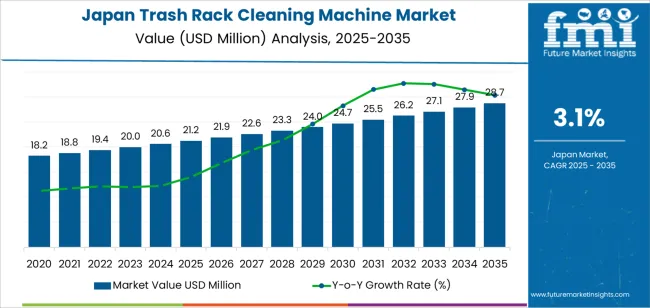
The growth momentum for trash rack cleaning machines in Japan is expected to experience a steady but gradual increase throughout the forecast period. Between 2025 and 2030, the demand will grow moderately, rising from USD 21.2 million to USD 21.9 million. This growth momentum is driven by industries increasingly looking for automated and efficient systems to improve maintenance processes, reduce downtime, and enhance productivity.
While the first five years show steady growth, the real momentum is expected to gain pace between 2030 and 2035, where demand will rise significantly from USD 21.9 million to USD 28.7 million. This surge in demand reflects a growing recognition of the benefits of automated trash rack cleaning machines, particularly as Japan’s industries prioritize sustainability and the efficiency of water-based operations. Technological advancements in automation, durability, and cost-effectiveness will contribute to the acceleration, as these systems offer more reliable, lower-maintenance solutions.
The growth momentum will be further driven by increased infrastructure investment, particularly in sectors such as hydroelectric power generation and water treatment. As these sectors continue to modernize and expand, the need for reliable, efficient cleaning machines will become more pronounced, driving the industry's growth.
| Metric | Value |
|---|---|
| Japan Trash Rack Cleaning Machine Value (2025) | USD 21.2 million |
| Japan Trash Rack Cleaning Machine Forecast Value (2035) | USD 28.7 million |
| Japan Trash Rack Cleaning Machine Forecast CAGR (2025-2035) | 3.1% |
The demand for trash rack cleaning machines in Japan is growing due to the increasing need for efficient and reliable water intake systems, particularly in power plants, water treatment facilities, and other industrial applications. Trash racks, which filter debris from water intakes, require regular cleaning to maintain optimal performance. The growing focus on operational efficiency and the need for automated solutions to ensure continuous, uninterrupted water supply systems are major factors driving the demand for these cleaning machines.
Japan's advanced industrial and power sectors, particularly those reliant on water for cooling and processing, are key drivers for this growth. As these industries expand and modernize, there is a greater emphasis on maintaining high-performance water intake systems. Trash rack cleaning machines help prevent blockages, equipment damage, and downtime, ensuring that facilities meet regulatory standards and operate smoothly.
Japan’s focus on environmental responsibility and compliance with strict regulations regarding water use and waste management is contributing to the increased adoption of automated cleaning systems. The demand for trash rack cleaning machines is expected to rise as industries in Japan continue to invest in technologies that enhance operational efficiency, reduce maintenance costs, and ensure compliance with environmental regulations.
Demand is segmented by type, application, and region. By type, demand is divided into hydraulic lifting and cable operated, with hydraulic lifting leading the demand. Based on application, demand is categorized into hydro power plants and plumbing stations, with hydro power plants holding the largest share. Regionally, demand is divided into Kanto, Kinki, Chubu, Kyushu & Okinawa, Tohoku, and the Rest of Japan, with Kanto and Chubu showing the highest concentration of demand due to their advanced infrastructure and large number of hydro power plants.
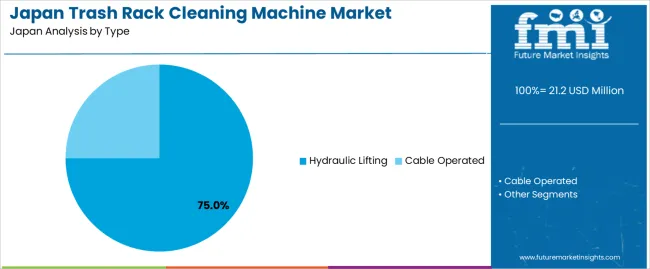
Hydraulic lifting accounts for 75% of the demand for trash rack cleaning machines in Japan. This type is preferred for its powerful, reliable performance in cleaning trash racks, particularly in hydro power plants. Hydraulic lifting machines provide the necessary lifting force and stability to remove debris efficiently from the trash racks in water intake systems, ensuring the continuous operation of hydro power plants. Their robustness and ability to handle large volumes of debris make them highly suited for large-scale operations.
Hydraulic lifting systems are also easier to maintain, require fewer adjustments, and offer consistent performance, which contributes to their widespread adoption in Japan’s hydroelectric power industry. The ability of hydraulic machines to work in harsh environments while providing high lifting capacities ensures their dominance in trash rack cleaning applications, especially in hydro power plants.
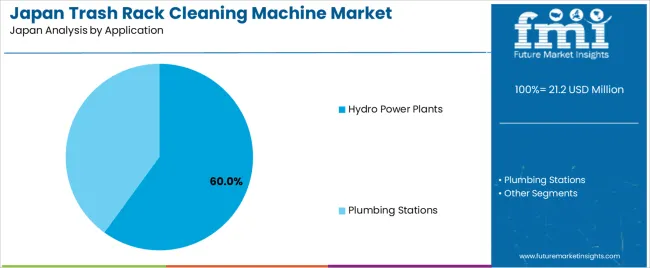
Hydro power plants account for 60% of the demand for trash rack cleaning machines in Japan. This high demand is driven by the critical role of trash racks in maintaining the smooth operation of hydro power plants. Trash racks prevent debris from entering the turbines and causing damage or operational inefficiencies. Given the importance of maintaining clean intake systems, hydro power plants require reliable and efficient trash rack cleaning solutions to ensure continuous power generation.
The demand for trash rack cleaning machines in hydro power plants has been further fueled by Japan's commitment to renewable energy and the increasing need for efficient energy production. As the country continues to prioritize hydroelectric power as a clean energy source, the demand for these machines is expected to remain strong, ensuring that the hydro power plants segment maintains its dominance in the industry.
The Kanto region holds the largest share of demand for trash rack cleaning machines in Japan due to its concentration of hydro power plants and other large-scale infrastructure projects. Kanto, which includes Tokyo, Yokohama, and surrounding areas, is the economic and industrial hub of Japan. The region is home to numerous hydroelectric plants and water treatment facilities that rely on efficient trash rack cleaning systems to maintain operations.
The Kanto region’s advanced infrastructure and the presence of key industries in energy production further drive demand for these machines. With Japan’s ongoing emphasis on renewable energy sources, particularly hydroelectric power, the Kanto region will continue to be the primary driver of trash rack cleaning machine demand in the country. This region's focus on technological advancements and large-scale energy projects ensures that Kanto remains the leading area for trash rack cleaning machine demand in Japan.
Demand for trash rack cleaning machines in Japan is growing amid efforts to modernise hydropower plants, strengthen water‑intake systems, and improve infrastructure resilience in ageing utilities. Key drivers include the country’s high proportion of hydroelectric generation, stringent operational‑efficiency demands at power and pumping stations, and a focus on automation and debris‑removal optimisation within water‑intake channels. Restraints include the high initial cost of automation systems, the niche retrofit industry (rather than new build), and the slow pace of replacements in smaller or regional water infrastructure.
Why is Demand for Trash Rack Cleaning Machines Increasing in Japan?
The increase in demand stems from operators seeking to reduce manual cleaning risks and maintain throughput at intake racks subject to debris and seasonal sediment influx. In Japan, many hydroelectric dams and pumping stations are mature and subject to stricter maintenance standards. Automated cleaning machines help reduce downtime, ensure uninterrupted water flow to turbines and pumps, and comply with regulatory expectations for operational safety. Further, as Japan invests in infrastructure renewal and seeks to integrate more automation, these machines become an important upgrade item.
How are Technological Innovations Driving Growth of Such Machines in Japan?
Technological developments are propelling uptake by enhancing machine performance, reliability and integration in Japanese water‑intake environments. Innovations include advanced hydraulic lifting mechanisms, remote‑monitoring sensors that detect debris accumulation and trigger cleaning, and modular designs suited for retrofit applications in constrained dam or pump‑station layouts. Improvements in corrosion‑resistant materials and automated control systems make these machines more viable in Japan’s harsh environments and contribute to reduced maintenance and lifecycle costs making the business case stronger for Japanese operators.
What are the Key Challenges Limiting Broader Adoption of Trash Rack Cleaning Machines in Japan?
Despite positive drivers, several challenges impede broader adoption in Japan. A primary issue is the capital expense automated trash rack cleaning machines involve substantial upfront investment which may not be justifiable for smaller facilities or where existing manual systems are still functional. Retrofit complexity also arises many Japanese water‑intake structures were designed decades ago and modifying them for modern automated cleaning can be costly and logistically difficult. Because the industry is largely driven by replacement rather than new builds, growth may be limited and incremental rather than expansive.
| Region | CAGR (%) |
|---|---|
| Kyushu & Okinawa | 3.8% |
| Kanto | 3.5% |
| Kinki | 3.1% |
| Chubu | 2.7% |
| Tohoku | 2.4% |
| Rest of Japan | 2.3% |
The demand for trash rack cleaning machines in Japan is growing across various regions, with Kyushu & Okinawa leading at a 3.8% CAGR. This growth is driven by the increasing need for efficient water intake maintenance in industrial and power generation facilities. Kanto follows at 3.5%, benefiting from the region's large number of water treatment plants and industrial operations. Kinki records a 3.1% CAGR, while Chubu shows a 2.7% CAGR, supported by the region's expanding industrial base. Tohoku and the Rest of Japan experience slower but steady growth, with CAGRs of 2.4% and 2.3%, respectively, as rural regions continue to modernize their water treatment infrastructure.
Kyushu & Okinawa is experiencing the highest demand growth for trash rack cleaning machines in Japan, with a 3.8% CAGR. The region’s growing industrial and water treatment infrastructure is a key factor driving this trend. As cities like Fukuoka and Okinawa invest in improving their water intake and filtration systems, there is an increasing need for efficient trash rack cleaning solutions. These systems help ensure that water intake structures remain clear of debris, ensuring smooth operations in industries like power generation, water treatment, and manufacturing.
The demand for trash rack cleaning machines is also fueled by the region’s increasing focus on environmental management and improving operational efficiency in water treatment and industrial facilities. As these sectors expand, the need for advanced cleaning equipment that can help reduce downtime and maintenance costs continues to rise. With the ongoing modernization of water treatment infrastructure in Kyushu & Okinawa, the adoption of trash rack cleaning machines is expected to keep growing.
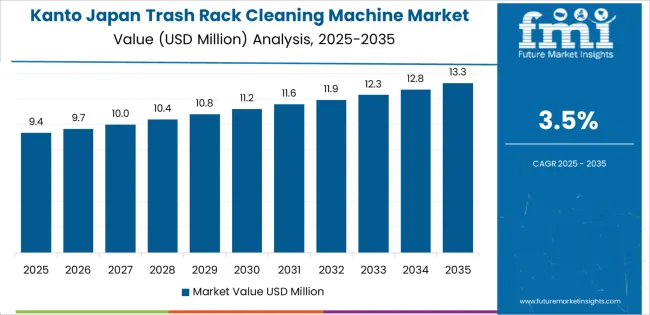
Kanto, including Tokyo and its surrounding areas, is seeing strong demand for trash rack cleaning machines with a 3.5% CAGR. The region’s high concentration of industrial operations, including power plants, water treatment facilities, and manufacturing industries, is driving the need for efficient water intake maintenance solutions. Kanto’s infrastructure, which supports a large portion of Japan’s population and economy, is increasingly focused on automation and reducing maintenance costs, creating a strong demand for trash rack cleaning machines.
As Kanto’s industrial sectors continue to grow and modernize, the region's demand for trash rack cleaning solutions is expected to remain strong. The increasing push for sustainability and more efficient water usage is driving the adoption of technologies that ensure the reliability of water intake structures. With continued investments in smart city infrastructure and cleaner technologies, Kanto will likely continue to lead in the adoption of trash rack cleaning machines, contributing to its steady growth.
Kinki, which includes Osaka, is experiencing steady demand for trash rack cleaning machines, with a 3.1% CAGR. The region’s strong industrial base, particularly in power generation, manufacturing, and water treatment, is a key driver of this growth. As the demand for water treatment and waste management increases, so does the need for efficient trash rack cleaning solutions to keep water intake systems operational.
The growing focus on minimizing downtime and optimizing industrial processes in Kinki is also contributing to the region’s adoption of advanced cleaning technologies. As more industries in the region prioritize sustainability and efficient water usage, the demand for reliable trash rack cleaning systems continues to rise. With Kinki’s continued investments in industrial infrastructure and clean water initiatives, the region’s demand for these machines is expected to grow steadily.
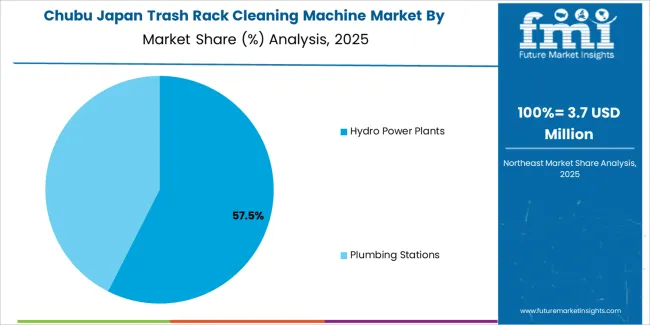
Chubu is seeing moderate growth in the demand for trash rack cleaning machines, with a 2.7% CAGR. The region’s industrial activities, including those in manufacturing, energy, and water treatment, are contributing to the increasing need for trash rack cleaning solutions. As Chubu continues to modernize its water treatment facilities and expand its industrial operations, the adoption of efficient cleaning technologies is on the rise.
Although the growth in Chubu is slower than in regions like Kyushu & Okinawa or Kanto, the increasing focus on reducing operational downtime and improving water intake system reliability is driving steady demand for trash rack cleaning machines. As the region invests in upgrading its water treatment infrastructure and continues to adopt more advanced technologies, the demand for these cleaning machines will continue to grow.
Tohoku is experiencing moderate growth in the demand for trash rack cleaning machines, with a 2.4% CAGR. The region is focusing on modernizing its water treatment infrastructure, particularly in the wake of past natural disasters. As Tohoku continues to rebuild and upgrade its facilities, there is a growing need for advanced cleaning technologies to ensure the continued functionality of water intake systems.
The region’s commitment to improving the efficiency and reliability of its water treatment plants is driving the adoption of trash rack cleaning machines, which play a critical role in preventing debris from blocking intake structures. While Tohoku’s growth in demand for these machines may be slower compared to other regions in Japan, the ongoing efforts to modernize the infrastructure, along with the region's focus on environmental sustainability and efficient water management, are expected to support steady demand for trash rack cleaning machines in the coming years.
The Rest of Japan, including rural and less populated areas, is seeing steady growth in the adoption of trash rack cleaning machines, with a 2.3% CAGR. This growth is driven by the ongoing infrastructure improvements, particularly in water treatment and power generation facilities. As these regions continue to invest in updating and expanding their industrial infrastructure, there is an increasing need for reliable and efficient cleaning solutions to maintain the integrity of water intake systems.
While growth is slower compared to more urbanized regions, the ongoing focus on environmental sustainability, water conservation, and maintaining operational efficiency is fueling the demand for trash rack cleaning machines. As the Rest of Japan continues to modernize its water treatment facilities and adopt more advanced technologies, the demand for trash rack cleaning machines will remain steady, contributing to the long-term growth of these solutions in the region.
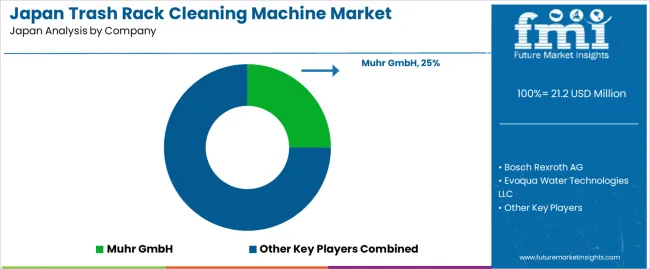
The demand for trash rack cleaning machines in Japan is growing steadily, driven by the country’s advanced hydroelectric and water intake infrastructure, aging facilities that require modernization, and stricter environmental regulations aimed at maintaining efficient water flow and debris management. With many power plants and water utilities operating in mountainous or complex terrain, the use of automated systems for trash rack cleaning has become increasingly important to ensure uninterrupted operation and reduce manual maintenance.
In Japan’s demand landscape, Muhr GmbH leads with a 25.0% share, reflecting its strong presence in supplying large-scale automated trash rack cleaning systems suited to Japanese infrastructure and operational requirements. Other key companies contributing to demand include Bosch Rexroth AG, Evoqua Water Technologies LLC, FRIULAIR S.R.L., and Jash Engineering Ltd., all of which offer equipment tailored for water intake maintenance and debris removal that meet Japan’s precision and reliability standards.
Key drivers of demand in Japan include investments in hydropower upgrades, the need for efficient water intake systems in both energy generation and water treatment plants, and a focus on automation to reduce downtime and labor costs. At the same time, challenges such as high initial investment costs and the technical complexity of integrating new systems into existing infrastructure may temper adoption in some facilities. Overall, the outlook for demand remains positive, supported by Japan’s commitment to sustainable water management and operational efficiency in its energy and utility sectors.
| Items | Values |
|---|---|
| Quantitative Units | USD million |
| Type | Hydraulic Lifting, Cable Operated |
| Application | Hydro Power Plants, Plumbing Stations |
| Regions Covered | Kyushu & Okinawa, Kanto, Kinki, Chubu, Tohoku, Rest of Japan |
| Additional Attributes | Dollar sales by type, application categories, and region trends, competitive landscape, advancements in trash rack cleaning technologies in Japan. |
The global demand for trash rack cleaning machine in Japan is estimated to be valued at USD 21.2 million in 2025.
The demand for trash rack cleaning machine in Japan is projected to reach USD 28.7 million by 2035.
The demand for trash rack cleaning machine in Japan is expected to grow at a 3.1% CAGR between 2025 and 2035.
The key product types in demand for trash rack cleaning machine in Japan are hydraulic lifting and cable operated.
In terms of application, hydro power plants segment to command 60.0% share in Japan in 2025.






Our Research Products

The "Full Research Suite" delivers actionable market intel, deep dives on markets or technologies, so clients act faster, cut risk, and unlock growth.

The Leaderboard benchmarks and ranks top vendors, classifying them as Established Leaders, Leading Challengers, or Disruptors & Challengers.

Locates where complements amplify value and substitutes erode it, forecasting net impact by horizon

We deliver granular, decision-grade intel: market sizing, 5-year forecasts, pricing, adoption, usage, revenue, and operational KPIs—plus competitor tracking, regulation, and value chains—across 60 countries broadly.

Spot the shifts before they hit your P&L. We track inflection points, adoption curves, pricing moves, and ecosystem plays to show where demand is heading, why it is changing, and what to do next across high-growth markets and disruptive tech

Real-time reads of user behavior. We track shifting priorities, perceptions of today’s and next-gen services, and provider experience, then pace how fast tech moves from trial to adoption, blending buyer, consumer, and channel inputs with social signals (#WhySwitch, #UX).

Partner with our analyst team to build a custom report designed around your business priorities. From analysing market trends to assessing competitors or crafting bespoke datasets, we tailor insights to your needs.
Supplier Intelligence
Discovery & Profiling
Capacity & Footprint
Performance & Risk
Compliance & Governance
Commercial Readiness
Who Supplies Whom
Scorecards & Shortlists
Playbooks & Docs
Category Intelligence
Definition & Scope
Demand & Use Cases
Cost Drivers
Market Structure
Supply Chain Map
Trade & Policy
Operating Norms
Deliverables
Buyer Intelligence
Account Basics
Spend & Scope
Procurement Model
Vendor Requirements
Terms & Policies
Entry Strategy
Pain Points & Triggers
Outputs
Pricing Analysis
Benchmarks
Trends
Should-Cost
Indexation
Landed Cost
Commercial Terms
Deliverables
Brand Analysis
Positioning & Value Prop
Share & Presence
Customer Evidence
Go-to-Market
Digital & Reputation
Compliance & Trust
KPIs & Gaps
Outputs
Full Research Suite comprises of:
Market outlook & trends analysis
Interviews & case studies
Strategic recommendations
Vendor profiles & capabilities analysis
5-year forecasts
8 regions and 60+ country-level data splits
Market segment data splits
12 months of continuous data updates
DELIVERED AS:
PDF EXCEL ONLINE
Demand Signal Repository Solutions Market Size and Share Forecast Outlook 2025 to 2035
Demand Side Management Market Size and Share Forecast Outlook 2025 to 2035
Demand Response Market Analysis - Size, Share, and Forecast Outlook 2025 to 2035
North America Shipping Supplies Market Trends – Innovations & Growth 2024-2034
Demand of Kozani Saffron in Greece Analysis - Size, Share & Forecast 2025 to 2035
Demand of No-acid Whey Strained Dairy Processing Concepts in European Union Size and Share Forecast Outlook 2025 to 2035
Demand for Bronte Pistachio in Italy Analysis - Size, Share & Forecast 2025 to 2035
Demand and Trend Analysis of Gaming Monitor in Western Europe Size and Share Forecast Outlook 2025 to 2035
Demand and Trend Analysis of Gaming Monitor in Korea Size and Share Forecast Outlook 2025 to 2035
Demand and Trend Analysis of Gaming Monitor in Japan Size and Share Forecast Outlook 2025 to 2035
Glycine Soja (Soybean) Seed Extract Market Size and Share Forecast Outlook 2025 to 2035
Demand and Trend Analysis of Yeast in Japan - Size, Share, and Forecast Outlook 2025 to 2035
Demand of Pistachio-based desserts & ingredients in France Analysis - Size, Share & Forecast 2025 to 2035
Western Europe Men’s Skincare Market Analysis – Forecast 2023-2033
Demand and Trends Analysis of Stevia in Japan Size and Share Forecast Outlook 2025 to 2035
Japan Women’s Intimate Care Market Trends – Growth & Forecast 2024-2034
Demand and Trend Analysis of Fabric Stain Remover in Korea Size and Share Forecast Outlook 2025 to 2035
Demand and Sales Analysis of Paper Cup in Korea Size and Share Forecast Outlook 2025 to 2035
Demand and Sales Analysis of Paper Cup in Western Europe Size and Share Forecast Outlook 2025 to 2035
Demand of MFGM-enriched Powders & RTDs in European Union Size and Share Forecast Outlook 2025 to 2035

Thank you!
You will receive an email from our Business Development Manager. Please be sure to check your SPAM/JUNK folder too.
Chat With
MaRIA